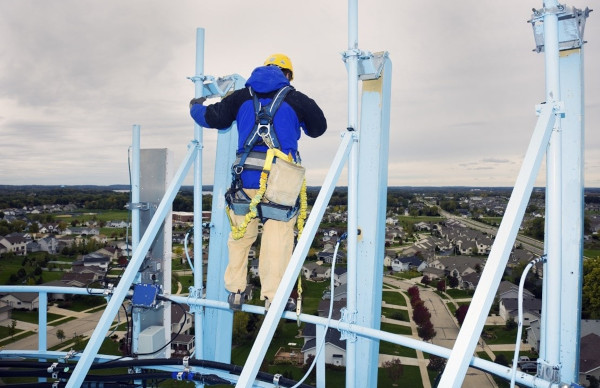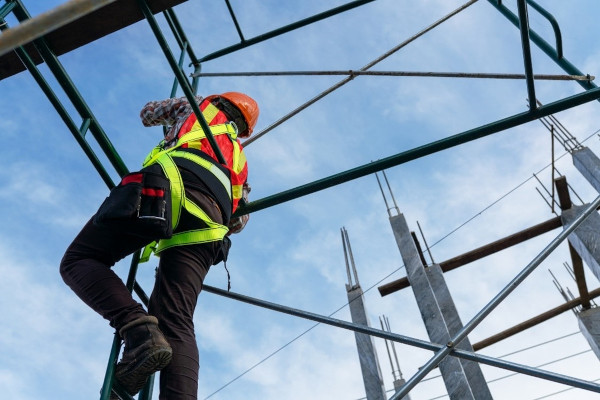Working at heights training
EMCARE is a proudly South African health and safety training company that offers working at heights training for anyone eager to perform their work at heights safely and professionally. In this quick guide, we have answered all the common questions about our working at heights training course as well as a few working at heights-related questions. With EMCARE, you can benefit from accredited, affordable, and high-quality working at heights training.

Your EMCARE Working at Heights Training Questions Answered:
Whether you are interested in pursuing a career at heights or your job includes work that is performed on ladders or scaffolds, you are going to need to take a working at heights course. EMCARE offers a variety of working at heights training courses that will ensure you are capable of performing your work at heights. If you are interested in our working at heights course for your career, we have answered the common questions around our working at heights training and working at heights.
1) What Does Working at Heights Training Cover?
EMCARE offers a Basic Working at Heights Course. This course will equip students with the practical skills and knowledge to perform their work at heights safely. This Basic Working at Heights Course focuses on instilling an attitude towards safety so that safety practices are the top priority for employees when performing their work at heights. The content covered in the course is aligned with the legislation of the Occupational Health and Safety Act 1993, which we have listed below.
- Working at heights definitions.
- Legislation pertaining to height safety.
- Risk assessments.
- Fall protection plans.
- Types of personal protective equipment.
- Height safety personal protective equipment.
- Identification and utilisation.
- Categories of work.
- Fitment and inspection.
- Suspension trauma.
The content covered in the Basic Working at Heights Course is designed to ensure safety for anyone who works at heights by reducing the risks of accidents, equipping students to perform rescues if necessary, and to be able to perform their work at heights in confined spaces. If a fall should occur, students will be trained to increase their chances of survival and reduce their risk of injury with the training from this Basic Working at Heights Course. This course will minimise risks for employers as employees who work at heights will have received adequate safety training and information.
2) How Much Does the Working at Heights Course Cost?
Our Basic Working at Heights Course will cost R1150.00 per enrolled student. We additionally offer savings for employers who book groups of employees into our Basic Working at Heights Course. We ensure that high-quality working at heights training is affordable for anyone who works at heights or is interested in pursuing a career working at heights.
3) How Long is the Working at Heights Course?
Our Basic Working at Heights Course is a one-day course. It will take you 8 hours to fully complete all the content covered in this course. Once complete, you will receive an accredited EMCARE Working at Heights Course certificate.
4) Does the Working at Heights Course Certificate Expire?
The EMCARE Basic Working at Heights Course certificate is valid for 3 years. After the 3 years, the certificate will expire and you will then need to do a refresher working at heights course to receive an updated certificate. The certificate expires to ensure that you are kept up to date with safety practices and procedures when working at heights.
5) When Should I Take the Working at Heights Refresher Course?
While the Basic Working at Heights Course certificate only expires after 3 years, it is generally seen as good work practice to take a working at heights refresher course every 2 years. By updating your skills and knowledge for working at heights every 2 years, you will ensure that you are always informed on the latest safety practices so that you can keep yourself and your colleagues protected while you perform your work at heights.

6) Are There Any Prerequisites for the Working at Heights Course?
For our Basic Working at Heights Course, the only prerequisite for individual candidates is that you are proficient at reading and writing in English. For groups of 10 or more, we are able to provide local language instructors for our Basic Working at Heights Course. We strive to make working at heights training as widely accessible as possible to ensure everyone can receive this essential safety training.
7) Where Can I Do Working at Heights Training?
Our Basic Working at Heights Course is available at all of our EMCARE branches. We have training facilities located in Johannesburg, Polokwane, Durban, Cape Town, Hoedspruit, and Gqeberha (Port Elizabeth). For the training of 10 employees or more, we will come to your premise to provide the employees with our working at heights training.
8) Why is Working at Heights Training Important?
Work performed at heights is highly hazardous for employees. Employees face the threat of falls which can lead to injury or death and being injured by falling equipment or materials. Working at heights can also include confined spaces, which can make the threat of injury or death greater if there is a hazard whilst performing work at heights.
Working at heights training is important because it enables employees to reduce their risks of injury or death whilst performing their work at heights. Employees will be able to accurately assess the risks of their work, will be aware of which personal protective equipment to use and how to inspect it for flaws, and how to create a successful fall protection plan to keep themselves safe. These essential skills will work toward reducing the risks associated with working at heights.

9) What Height Requires Working at Heights Training in South Africa?
Working at heights training is essential for anyone pursuing a job that involves heights. In South Africa, any work that is 1.5 meters above the ground requires that employees receive a certificate from a working at heights course. It is mandatory for employers to equip employees with working at heights training if they require work to be performed above the stipulated height.
10) Do I Need a Medical to Work at Heights?
Due to the high-risk nature of working at heights, you are required to do a medical in order to be certified fit and safe to perform your work at heights. A working at heights medical will involve a general health screen, which will check for aspects such as vision and BMI. You will also be checked for hypertension, epilepsy, diabetes, heart diseases, and depression, as any of these physical and mental conditions could impair your ability to safely perform work at heights. You will need to do the Tecumseh Step Test to assess your cardiovascular fitness levels and a grip strength test.

11) Are There Other Useful Courses for Working at Heights?
While the Basic Working at Heights Course will equip you to confidently pursue a career working at heights, there are additional courses you can take to further increase your safety capabilities and working at heights skills. We have briefly outlined three of our additional working at heights courses that will be useful for your working at heights career.
- Basic Fall Arrest Course: The EMCARE Basic Fall Arrest Course will provide employees who are required to climb structures to reach their work at heights with the skills to do so safely. Students will learn how to use, inspect, assemble, and store basic fall arrest equipment. This course will elevate the safety skills of students who have enrolled in the EMCARE Basic Working at Heights Course.
- Portable Ladder Course: The EMCARE Portable Ladder Course is essential for anyone whose job involves using ladders to reach their work at heights. This one-day course will cover all essential aspects around safely using ladders, such as risk assessments, securing a portable ladder, and managing fall factors.
- Scaffolding Erectors Course: The EMCARE Scaffolding Erectors Course will teach you how to correctly erect and dismantle scaffolding. Included in this practical two-day course will be how to interpret basic drawings and instructions, how to erect a scaffold that is compliant with regulations, and how to erect and dismantle scaffolding efficiently. This course is especially useful for anyone pursuing a working at heights job in the construction industry.

About EMCARE:
Since 1997, EMCARE has been providing South Africa with specialised health and safety training. In addition to our working at heights courses, we offer high-quality emergency medical training courses, health and safety training courses, fire and rescue training courses, and hand tool operator training courses. We have a course designed to ensure your safety and expertise in careers across a diverse range of industries.
All EMCARE courses are offered by fully qualified and experienced trainers. We have positioned ourselves as the best training provider in our industry, which means that we will only offer you courses with trainers of the highest quality. Our trainers are passionate about teaching health and safety and are dedicated to ensuring you walk away with the skills, knowledge, and attitude to pursue your career confidently.
EMCARE is a fully accredited health and safety training company. Our courses are accredited by the Department of Labour, the Department of Mineral Resources, the Health and Welfare Sector Education and Training Authority (HWSETA), and the Local Government Sector Education Training Authority (LGSETA), as well as all other relevant regulatory associations. Our courses are continuously monitored by these regulatory bodies to ensure that our standard of training is upheld.
Gain the skills and knowledge you need to pursue a career working at heights with EMCARE’s working at heights training.
GET IN TOUCH
There are a few ways to reach us below. Please feel free to contact us via phone, email or you can send us a message via the form provided and we will get back to you.




















